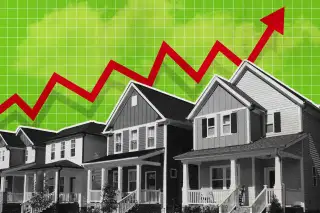‘Whiplash’: Mortgage Rates Have Not Been This Volatile Since 1987

If it feels like mortgage rates are moving faster than you can refresh Zillow, it’s probably because they are.
A new analysis from real estate brokerage Redfin finds that mortgage rates are the most volatile they’ve been in 35 years.
Between July and September, the company found that on average, rates moved by half a percentage every four weeks — making the period the most volatile time for mortgage rates since 1987.
Those big swings can translate into major headaches for hopeful buyers, who may find themselves looking at tens of thousands of dollars more in mortgage costs at closing than they anticipated when starting their home searches.
Redfin gives this example from a hypothetical buyer who began searching for a $500,000 home in July. That month, when mortgage rates were at 5.7%, that buyer was looking at a monthly payment of $3,051 (assuming a 30-year term and a 20% down payment).
When the buyer found their ideal home on the market in August, rates had dropped to a little under 5% and their projected monthly payment fell to $2,874. When the buyer locked in a mortgage rate to close on the house in September, rates had climbed back up to nearly 6.3% and the monthly payment had ballooned to $3,202.
“The challenges homebuyers face in today’s market go beyond the dwindling affordability caused by high mortgage rates and home prices,” Redfin Deputy Chief Economist Taylor Marr said in a statement. “The whiplash in mortgage rates between when homebuyers set their budget and when they make an offer is also making it extraordinarily difficult to plan ahead.”
Why are mortgage rates so high?
Average mortgage rates have soared from just over 3% at the beginning of the year to more than 6% today. Rates recently reached the highest level since October 2008. Accompanying that rapid rise was an equally rapid cooling of the housing market.
The reason for the sudden change? The Federal Reserve’s ongoing battle with inflation, which is hovering around a 40-year high. To help bring prices back down to earth and ease the financial burden on American households, the central bank has been steadily raising its benchmark interest rate from the rock-bottom lows of 2020. The idea is to make borrowing money more expensive, which will eventually cool the economy down.
As the Fed’s interest rate rises, mortgage lenders are raising their rates, too. In a blog post last week, Realtor.com Manger of Economic Research George Ratiu noted that the Fed’s tightening is “achieving its intended purpose,” pointing out that home sales and home prices have both fallen over the past few months.
That’s been good news from some buyers (a slower market means less competition and more price cuts), but it means more challenges for those who can’t afford to borrow at today’s elevated rates.
How to deal with fluctuating mortgage rates
Thankfully, there are some strategies you can use to buy a home when mortgage rates are volatile. You can explore an adjustable-rate mortgage (ARM), which will often have a lower introductory rate than a traditional fixed-rate mortgage. Pay attention to when the fixed introductory rate period ends because interest rates on ARMs can potentially climb into the double-digits if you don’t refinance before then.
Many lenders also offer rate locks, which will let you freeze your mortgage rate during the closing process in case rates rise during the process.
Of course, if you need to buy a house and can afford to do so, there isn't much use in trying to time the market. A mortgage calculator can help you determine what you can afford at current interest rates. Once you have your budget, stick to it. And remember: There's also the option to refinance your fixed-rate mortgage if rates fall in the future.
More from Money:
10 Cities Where Homes Sales Are Most Likely to Collapse
The Fed Says the Housing Market Needs a 'Correction.' What Does That Mean?